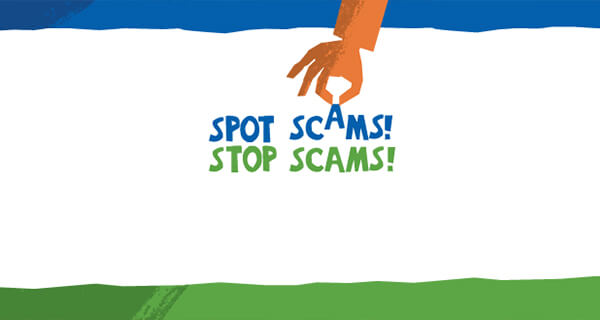Scams Awareness Month is running throughout May to warn about the fraudsters preying on hard-up households.

Citizens Advice warns that as people across the country struggle to make ends meet they are being sized up by devious con artists. Scammers are targeting the elderly and desperate people with squeezed finances to swindle them out of their money.
Fraud offences in England and Wales rose by 25% in 2013, compared to the previous year, with 207,252 cases reported to Action Fraud and the police. But Citizens Advice has calculated up to four million people could be scammed each year as many scams go unreported.
Citizens Advice, Citizens Advice Scotland and the Trading Standards Institute today launch Scams Awareness Month and throughout May are urging people to “fight back against the fraudsters”.
People are just as likely to be conned over the phone and via text messages as they are through emails and websites. New analysis reveals:
- Over a third of scams (34%) were over the phone
- Almost a quarter of scams (24%) were through visits to a web site
- 16% were letter or fax scams
- One in ten scams (10%) were through emails
Citizens Advice is warning that people should watch out for non-secure websites that ask for financial details. It’s important that people realise scammers are also at the end of the phone and on your doorstep.
Counterfeit cashier cheques, fraudulent lenders offering loans to get hold of personal details, dating scams, ticket cons and computer hacking were amongst commonly reported scams. Online shopping and auction fraud was the biggest single fraud type with almost 40,000 recorded cases.
Fight back against the fraudsters
Citizens Advice Chief Executive, Gillian Guy, said: “Scammers are picking the pockets of millions of innocent people. Pensioners and hard-up households face invasion through their computers, phones, letterboxes, and on the doorstep.
“Every day Citizens Advice staff and volunteers hear from people who have lost out after being tricked. We are running Scams Awareness Month to encourage people to fight back against the fraudsters pushing their cons into the nation’s homes by reporting those scams.”
Trading Standards Institute (TSI) chief executive, Leon Livermore, said: "Trading standards are on the frontline when it comes to protecting vulnerable people from these scams. Their work makes it tough for scammers to get through to the country's most vulnerable. Scams Awareness Month gives trading standards and partners like Citizens Advice the opportunity to reach out to those most at risk from scammers, and educate them and members of the community as to how to avoid falling victim to these insidious schemes."
A flat hunter saw a property advertised online. He gave the landlord the necessary costs totalling £1450 via bank transfer and £200 cash. When he went to move into the property someone else was already living there. The ‘landlord’ had fraudulently advertised the property.
Top tips for dealing with scams:
- If it sounds too good to be true it probably is.
- Never give out your bank details or send money unless you are certain you can trust the person contacting you.
- Contacted out of the blue? Be suspicious.
- Your bank and the police will never collect your bank card, ask for your PIN or come to your home.
- Make sure the website’s secure, if you are buying online – check for the padlock or “https” next to the web address
- It you haven’t bought a ticket you can’t win it.
- You shouldn’t have to pay anything to get a prize.
- Pressure to make a decision straight away? Take your time and just say: “No thank you”.
- Walk away from job ads that ask for money in advance.
- Computer firms do not make unsolicited phone calls to help you fix your computer.
- Don’t suffer in silence – tell others about scams.
For further information on the research visit the Citizens Advice website.
Please note that Action Fraud is not responsible for the content of external websites.
To report a fraud and receive a police crime reference number, call Action Fraud on 0300 123 2040 or use our online fraud reporting tool.



